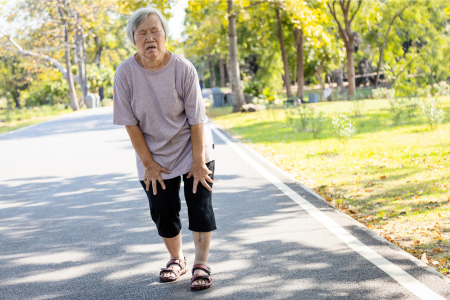
Managing & minimizing COPD flareups
A flareup (also called an exacerbation) occurs when your COPD symptoms quickly become worse and stay worse for at least one or two days.
What is a COPD flareup?
A flareup (also called an exacerbation) occurs when your COPD symptoms quickly become worse and stay worse for at least one or two days. Respiratory infections and air pollution are the two most common triggers of COPD flareups.
What are some common signs of a COPD flare up?
- More coughing than usual
- Coughing up more phlegm, phlegm is a different colour
- More breathlessness, wheezing
- Fatigue
What do I do if I have a flareup?
Learning how to lower your risk of a flareup and managing them when they do occur is a big part of managing your COPD. It’s important that you speak to your care team about how to recognize a flareup and what to do when and if you have one. Work with your care team to create a COPD Action Plan.
You can treat many flareups at home, especially if caught early. Your provider may prescribe a fast-acting or “rescue” inhaler for you to use when you have a flareup. This will dilate (expand) your airways to make it easier for you to breathe.
You may also need to take steroid pills for several days to help quickly reduce the swelling in your airways. Corticosteroids slow or stop the immune response that is causing your airways to swell.
These are examples of fast-acting medications. You may also use a long-acting inhaler every day even if you feel well to help prevent flareups and manage your COPD. This inhaler contains a bronchodilator and may also include steroid medication. These are different from the inhaler and steroids used to help your breathing improve during a flareup.
Your provider may prescribe antibiotics for you to take if you suspect the flareup is being caused by a chest infection.
If your flareup is more serious, if you experience frequent flareups or if you have other conditions that affect your health, you may have to visit your doctor or even go to the hospital. Among Canadians over 65, COPD is the third-leading cause of hospital admission.
What is a COPD Action Plan?
A COPD Action Plan is a personalized plan that you create with the help of your doctor and COPD care team. You can use your plan to record what “normal” feels like for you so that you can tell when you’re experiencing a flareup. You can record the medication you take every day to stay well, and what medication to take in the case of a flareup.
Your action plan will help you recognize the signs of a flare-up so that you’re able to treat the flare-up early. By preventing your flare-up from getting worse, you are more likely to avoid a visit to the emergency room.
Action plans are typically divided into three sections:
- a green section where you record what “normal” is for you,
- a yellow section will list signs of a bad day that could indicate a flareup and what you should do when this occurs, and
- a red section will help you identify when you need urgent medical attention.
What can I do to prevent or reduce flareups?
One of the main goals of treatment of COPD is to prevent flareups from occurring. There are many things that you can do to help manage your COPD and reduce your risk of flareups.
Learn about your COPD
Learn about COPD and what you can do to keep yourself as healthy as possible. Learn what triggers your COPD and what "normal" is for you and record this as part of your COPD Action Plan.
Quit smoking
Smoking is the number one cause of COPD. Smoking can cause flareups and over the longer term, can cause your COPD to progress faster because of the ongoing damage to the lungs.
Get vaccinated
Because respiratory infections are a major cause of COPD flareups, it's important that you stay up to date on your vaccinations for flu, COVID-19, pneumonia and respiratory syncytial virus. You should also practice proper handwashing, avoid crowds and wear a mask if you will be in close contact with others.
Stay active
Exercise is very important if you have COPD. It helps your muscles work more efficiently and makes your lungs stronger. It can help you maintain a healthy weight and give you more energy.
Eat healthy
Healthy eating not only helps prevent obesity but it also provides your body with the energy it needs and supports your immune system. Certain foods also have anti-inflammatory properties. In later stages of COPD when weight loss is common, it's even more important that your body receives the nutrition it needs to prevent additional comorbidities and frailty.
